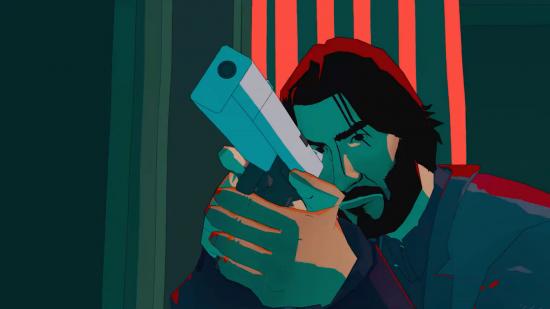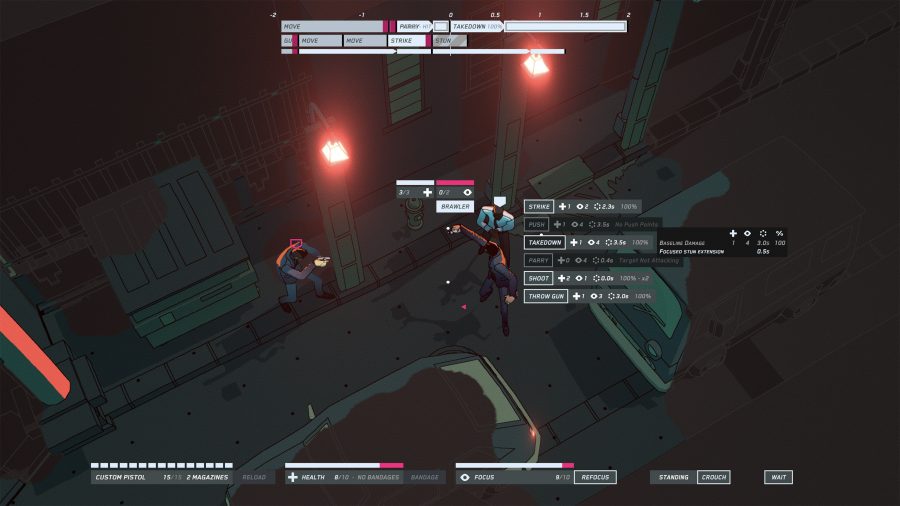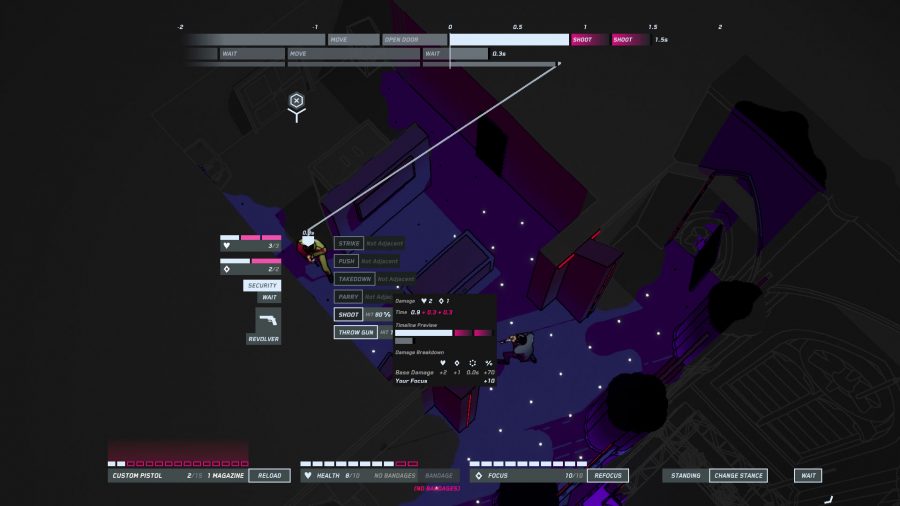As with the man himself, the full context of John Wick Hex is difficult to discern. Bithell Games’ licenced collaboration with entertainment powerhouse Lionsgate is an idiosyncratic interpretation of the all-action movie series. Where lesser minds may have proffered a reskinned brawler, Hex swerves unapologetically close to turn-based tactics territory – in fact, as game director Mike Bithell reveals, it started life as a single-character XCOM-like, “until we realised how boring XCOM with one character was”.
Will Keanu be part of the game? Bithell can’t confirm that yet. What’s the setup? Well, it’s a prequel that takes place before John meets ill-fated wife Helen, but beyond that the story is entirely under wraps. What’s with that replay button? You’ll have to wait a little longer for more info. Why Hex? Well, here’s one we can answer – sort of. There’s deeper meaning buried in the story that Bithell can’t yet reveal, natch, but the name was originally the most logical working title for a game that plays out on a hex grid. Hard, angular facts be praised!
So, hex grids and thoughtful strategy. It’s an odd choice on paper, seeming unlikely to support the rough-edged, fraught, and instinctive combat that defines the movies. But it all makes sense once you experience it in motion. The game pauses while you decide how to react to each situation, but everything plays out in real time when you end your planning phase. Each action available to you costs time, and is added to a timeline at the top of the screen which resembles the kind of thing you might find in video editing software.
You can see enemies’ timelines, too, allowing you to make educated decisions on how to respond. You may not have time to get into cover before an adversary opens fire, for example, but you could interrupt the action by tossing your empty gun at their head to stagger them, buying you a few extra seconds to roll behind that table and grab the discarded weapon next to the goon whose neck you recently snapped. It feels desperate but controlled, animalistic yet cool-headed. Most importantly, you feel like John Wick. It’s a disarmingly convincing representation of the films’ combat, and it all flows beautifully.
Related: All the E3 2019 games announced for PC
“When you move your eyes, your brain doesn’t see the movement,” Bithell enthuses when we ask him about the design. “When you look from here to over there, your brain deletes all the information that happened in between, otherwise you’d get motion sickness. That’s how I think the stop-start nature of [Hex] works – because you’re thinking in those moments, between the action, your memory of playing the game doesn’t have those pauses in it because that’s just your consideration time.”
It’s certainly effective, but that doesn’t diminish the fact that the tactics genre, semi-real time or otherwise, isn’t exactly a mainstream proposition. Is there any concern at all, we wonder, whether enough John Wick fans will warm to the game?
“For me, it felt like an interesting opportunity to be a little bit cocky in that indie way, and go, ‘Well, what if we tried to make a good licenced game?’,” Bithell retorts. “That’s an interesting challenge. The licenced games I absolutely love – the Batman Arkham series, Chronicles of Riddick, the ones that always get trotted out – are projects where they took the thing they were adapting very seriously and built a game. Especially with Batman – that really was built from the ground up as ‘How do you turn Batman into a videogame protagonist?’, and that was the big thing.
“No one on the Batman team sat down and went, ‘What can we adapt from games we like? What can we clone and then stick a batsuit on?’ That approach stood out for me – I loved that game for that, because it felt so fresh. There were a litany of ideas in there that weren’t in other games – it was just completely its own thing.”
According to Bithell, the Hex team went on a similar journey with its game, and has benefitted from a uniquely close relationship with the film’s production crew. “Even though we started with something that was a bit more of a run-of-the-mill XCOM strategy turn-based thing, it’s morphed as we’ve developed it because the stunt team’s helped us work out a move, or [trilogy director] Chad Stahelski had a question about line of sight and wanted us to tweak how it works. We’ve created a game that we couldn’t have made without John Wick.
“Because of the respect we have for the franchise, and because we’ve taken it so seriously, we have the room to do more things. Because we’re not just cloning the movie, we’re talking to the people who created the movie – we have access to their thought processes, and so we can build on their intent rather than their output when it comes to the art style, the story, and so on.”
The result is a game that looks familiar in many ways – there’s a recognisable approximation of Keanu, we’ve all seen hex grids before – but feels unusual at every level. This isn’t Bithell’s first licensed project – he worked on a number of such endeavours during his stint at Blitz Games – but it’s the first one he’s had this level of creative control over. And though undoubtedly buoyed by the trust and enthusiasm Lionsgate has shown, he is boldly sanguine when it comes to the inherent risk of trying something a bit different with a property people already know and love.

“I think you’ve got to take the opportunity and make something cool,” he tells me, without pausing to construct his answer. “If you’re making a licensed game and not trying to push the medium forward, in my opinion you’re wasting your time.“
More turns: The best strategy games on PC
It’s a worthy sentiment with which we couldn’t agree more, and we’re keen to see what else John Wick Hex has in store.


